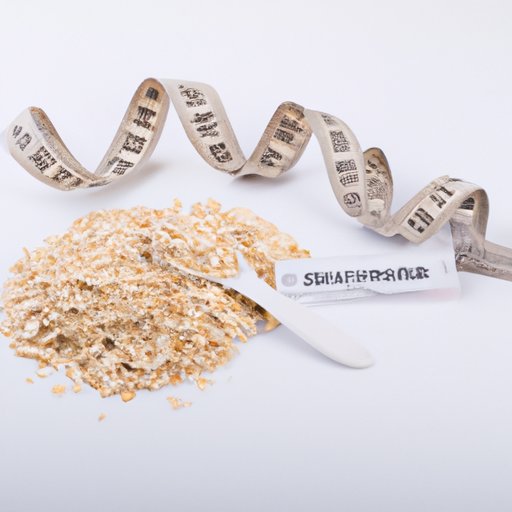
I. Introduction
Oats are a pantry staple, but their relationship with weight gain can be confusing. Some people believe that eating oats can make you gain weight. In this article, we will separate fact from fiction and explore the truth behind oats and weight gain.
II. The Truth Behind Oats and Weight Gain: Separating Fact from Fiction
Oats are a type of cereal grain that are rich in nutrients like fiber, protein, and vitamins. They are commonly eaten as a breakfast food in various forms like oatmeal and overnight oats.
There is a common misconception that eating oats can make you gain weight. However, studies have found that this is not necessarily true. In fact, oats can be a healthy addition to your diet and may even help with weight management.
III. Why Oats are Not the Culprit for Your Weight Gain
Weight gain is caused by consuming more calories than your body uses. Simply put, it all comes down to energy balance. Eating oats alone will not cause weight gain, but consuming extra calories can lead to weight gain.
Oats are a low-calorie, filling food that can be a great addition to a balanced diet. One cup of cooked oats contains only 166 calories and four grams of fiber, which can help you feel full and satisfied. To avoid adding extra calories, it’s important to watch your portion size and toppings when eating oats.
IV. Oats and Weight Management: Debunking the Myth
So, can oats actually help with weight management? The answer is yes! Oats are high in fiber which can help regulate your blood sugar levels and keep you feeling full for longer. This means you may consume fewer calories throughout the day and may not feel the need to snack as often.
One study found that adding oats to the diet of overweight individuals led to a significant reduction in body weight and body mass index (BMI) over a 12 week period.
There are many ways to incorporate oats into your weight management plan. You can enjoy them topped with fresh fruit and a drizzle of honey, added to smoothies, or even used as a substitute for flour in baking recipes.
V. Eating Oats for Weight Loss: How it Can Help Shed Pounds
If you’re looking to shed a few pounds, adding oats to your diet can be a great start. Oats are low in calories and high in fiber, which can help you feel full and satisfied without consuming excess calories.
One study found that when individuals consumed oatmeal for breakfast, they felt less hungry and consumed fewer calories at lunch compared to those who ate a sugary cereal for breakfast. This suggests that starting your day with oats can help regulate your appetite and lead to a reduction in overall calorie intake.
When preparing oats for weight loss, it’s important to avoid adding extra calories through toppings like syrup or nuts. Instead, try adding fresh berries, cinnamon, or a small amount of honey.
VI. The Science Behind Oats and Weight: Understanding Their Impact on Your Body
When you eat oats, your body breaks down the carbohydrates into simple sugars which are then absorbed into the bloodstream. The fiber in oats slows down this process, which can help regulate your blood sugar levels and prevent spikes and crashes. This can lead to more consistent energy levels throughout the day and may help reduce cravings for sugary snacks.
Oats are also a good source of protein and iron, which are important nutrients for overall health and wellbeing. However, if you have celiac disease or a sensitivity to gluten, it’s important to choose gluten-free oats to avoid any adverse reactions.
VII. Conclusion
In conclusion, oats are not the enemy when it comes to weight gain. Eating oats alone will not cause weight gain, but consuming excess calories can. However, incorporating oats into your diet can be a great addition to a weight management plan and may even help with weight loss.
So, next time you reach for a bowl of cereal, consider swapping it out for a bowl of oats topped with your favorite fruits and nuts.





